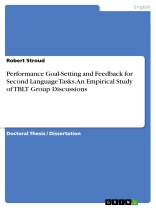Doctoral Thesis / Dissertation from the year 2018 in the subject English Language and Literature Studies – Linguistics, grade: Pass (Ph D), University of Birmingham, language: English, abstract: This book draws on a classroom-based empirical study to explore the actual effects that Task-Based Language Teaching (TBLT) has on students’ performance, when applied to group discussions, and the impacts that different forms of Goal-Setting and Feedback (GSF) have on their learning. In doing so, it challenges the assumptions in the research literature that TBLT will necessarily improve multiple aspects of performance within group discussions with low-level students, and reveals that applying GSF can lead to very different outcomes.
A longitudinal mixed-method approach was adopted using surveys and peer-interviews with 10 teachers, and observations, surveys and peer-interviews with 132 low-level students in a Japanese university. Students used product or process GSF alongside TBLT group discussions across a semester. Findings showed improvements in fluency and accuracy, positive feelings towards learning, and larger improvements for lower performers. Furthermore, product and process goals influenced students’ focus differently in terms of individual performance, collaboration and discussion outcome. These findings create a clearer picture of the impact of TBLT, when applied to group discussions, and show how students’ focus within learning can be greatly influenced by task goals. Resultant recommendations for course design, student and teacher training, and implementation of TBLT and GSF are given.
Despre autor
Robert Stroud has a Ph.D. (English Language and Applied Linguistics) from the University of Birmingham. He also has an M.A. in Applied Linguistics and English Language Teaching (Distinction) from the University of Nottingham. His research focuses upon the combination of technology and specific teaching methodologies (such as task-based learning) to improve the communicative competence of students in language learning. He has most recently undertaken detailed classroom studies related to the effects of computer-assisted language learning and learning task design features upon student participation, engagement and communicative competence.












